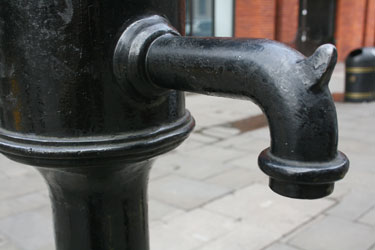APHA’s Public Health Education and Health Promotion Section is celebrating both its centennial and the power of advocacy to improve U.S. public health. In this member guest post, M. Elaine Auld, MPH, MCHES, and Regina A. Galer-Unti, PhD, highlight the Section’s role in health policy advocacy and education and call on voters to keep public health in mind during the upcoming elections.
With the 2022 midterm elections nearing, will public health issues be on the minds and hearts of voters as they approach the ballot box? Or has COVID-19 left too many citizens – including many of us public health professionals – deflated, equating the “P’ in public health with the polarizing “P” in politics?
Before you throw in the towel, recall that even the proposal to remove London’s Broad Street pump handle in the 1850s was wrought with political controversy. John Snow advocated against opponents who fiercely disputed his theories about the spread of cholera. Today, members of the John Snow Society commemorate the historic political struggles of that public health era by annually removing and replacing the pump handle in London.
This year, as we celebrate the 100th birthday of the APHA Public Health Education and Health Promotion Section, we toast the fundamental role of advocacy in health education and its contribution to policy changes that reduced not only the spread of cholera, but also many other infectious and chronic diseases. The profession of health education and health communication has been integral in promoting significant legislative policies and regulations related to primary, secondary and tertiary prevention during the last century. For example, multi-level strategies of community-based health education have helped catalyze the political will of citizens and policymakers for tax increases on tobacco products, smoke-free workplaces and restaurants, as well as injury prevention policies, such as seat belt laws and legal limits for alcohol-impaired driving.
Particularly important and often overlooked are the scientific theories, principles, ethics and evidence-based practices that undergird health education and are critical to decades of policy advocacy in advancing an informed democracy. Beyond the limited view of health educators creating pamphlets, we are trained to “start where the people are,” engaging the community by building trust and demonstrating authentic cultural humility where all voices have an equal say at the table.
Health education specialists are equipped with skills in organizing, expanding and sustaining coalitions, which not only advance successful advocacy efforts but also are vital to ensuring that new policies are enforced and their impact is measured and documented. Skills in persuasive communication and uses of social media and informatics advance advocacy campaigns, often bringing to public attention the disparate impact of social and economic conditions on various disenfranchised populations.
Some 100 years after John Snow, the first graduate standards of health education alluded to advocacy and were adopted by APHA as part of the criteria for early accreditation efforts. Several decades later in the 1980s, the Health Education Role Delineation Project, which formed the basis for contemporary health education certification, noted that health educators should have the skills to prepare written and oral testimony, communicate with policymakers, interpret health policies, use persuasive strategies, participate in health policy planning; and analyze political processes.
With an even greater recognition of the role of policy in public health, PHEHP members in 2020 contributed to the psychometric Health Education Specialists Practice Analysis II, which resulted in advocacy being elevated as a distinct area of responsibility. Entry-level and advanced health education specialists are expected to master four competencies and 18 sub-competencies related to planning, implementing and evaluating policy, system or environmental changes.
Many professional preparation programs incorporate APHA’s annual Policy Action Institute as well as the Annual Health Education Advocacy Summit to provide students the hands-on experience of meeting with legislators about public health priorities. The PHEHP Section helped to launch the Advocacy Summit in 1998 and continues to support this educational opportunity involving many faculty, students and practitioners each fall. We are also proud that many PHEHP members were selected for APHA’s Public Health Fellowship in Government and spent a year as working as staff for members of Congress. Examples of the impact of such advocates include increased appropriations for public health and passage of the Every Student Succeeds Act, which included school health education as a well-recognized subject, as important as reading and math.
In commemoration of PHEHP’s 100th birthday, we urge you to join us in championing advocacy by voting in your state and district for candidates who support APHA’s public health priorities. You can make a difference by:
- attending and testifying at candidates’ town halls,
- volunteering in campaigns for public health allies,
- writing op-eds and using social media to educate others, and
- working with your state and local APHA-affiliated public health association and enlisting your Affiliate’s health educators.
But don’t stop there! After November’s elections, join us in further “walking the talk” as policy advocates. The “P” in public health demands our promise, pledge and promotion of policies that foster healthy communities and our goal of improving health equity and social justice for all.
APHA is sharing resources to promote the connection between voting and health, including social media graphics. For information on the PHEHP Section’s schedule at APHA 2022, including its Nov. 7 social, visit the meeting program.
Caption: A replica of the Broad Street pump handle in London. Today, members of the John Snow Society commemorate the historic political struggles of the public health era in the 1850s by annually removing and replacing the pump handle in London. (Photo by Michele Late)